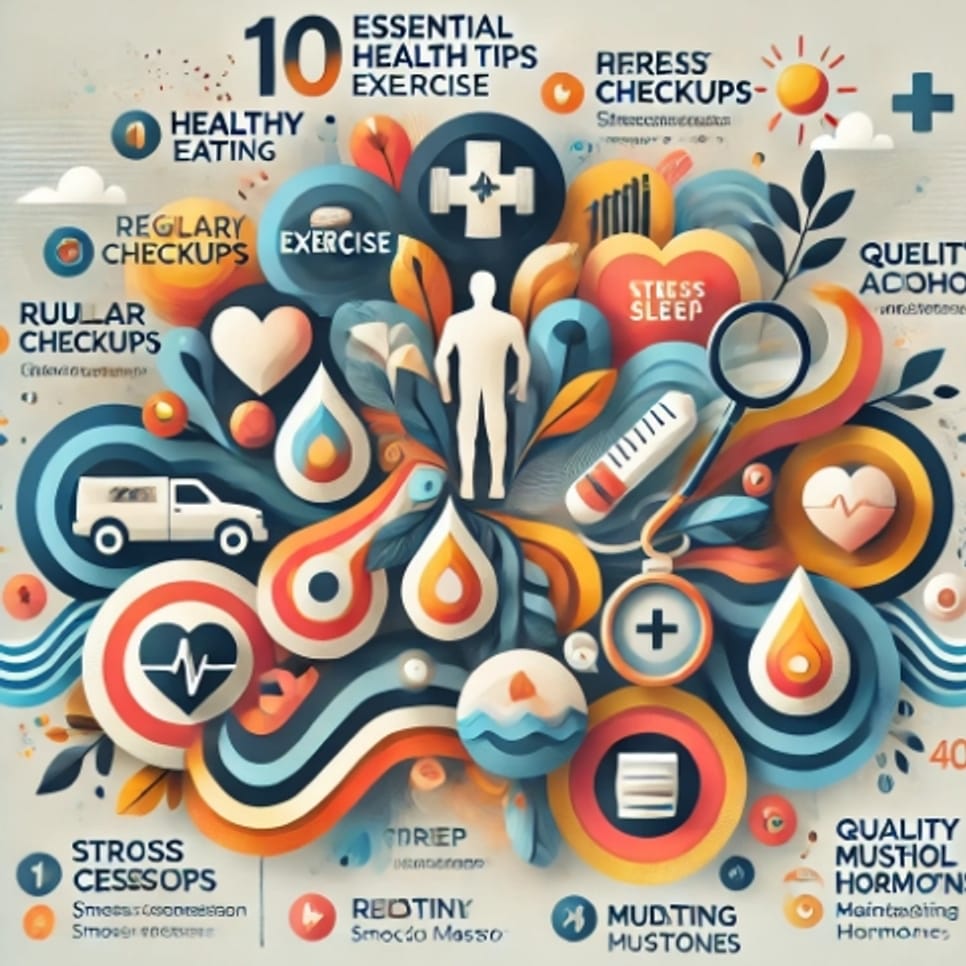The 40s mark the beginning of significant physical and mental changes, making health management crucial for quality of life. Metabolic rate decreases, leading to decreased physical strength, hormonal shifts, and an increased risk of various diseases.
How you manage this period directly impacts your health in your 50s and 60s, highlighting the need for thorough health management starting now.
This article outlines ten essential tips for maintaining health after age 40. We focus on practical methods such as diet, exercise, and regular checkups, to help you maintain a healthy life.

Health Management Tips
1. Maintain a Healthy Weight
After 40, metabolism slows, making weight gain easier. Since obesity is a major cause of chronic diseases like hypertension, diabetes, and arthritis, maintaining a healthy weight is crucial.
- Eat smaller portions: Eat three meals a day regularly, but reduce the amount you eat at each meal.
- High-protein, low-fat diet: Increase protein intake and reduce fat intake to maintain muscle mass and prevent fat accumulation.
- Post-meal walk: Walking for 30 minutes after meals helps boost metabolism.
2. Regular Exercise
Exercise is indispensable for health management. Combining strength training and cardiovascular exercise is particularly important.
- Cardiovascular exercise 3-4 times a week: Walking, jogging, cycling, etc., maintain cardiovascular health and manage weight.
- Strength training: Include exercises such as push-ups, squats, and planks to prevent muscle loss.
- Stretching: Practice stretching every morning and night to maintain joint and muscle flexibility.
3. Improve Sleep Quality
As we age, sleep quality significantly impacts health. Sufficient sleep relieves fatigue and strengthens immunity.
- Sleep routine: Maintain a consistent sleep and wake-up schedule.
- Improve sleep environment: Create a conducive sleep environment in a dark room with a calm atmosphere.
- Limit electronics: Reduce smartphone and TV use one hour before bedtime.
4. Regular Health Checkups
Regular checkups are essential after age 40. Early detection can save lives.
- Blood pressure, blood sugar, and cholesterol tests: Important for preventing cardiovascular disease and diabetes.
- Cancer screenings: Regularly screen for cancers such as colon, liver, breast, and prostate cancer, which have a higher incidence rate in middle age and beyond.
- Bone density test: Osteoporosis is a major threat to bone health in middle age and beyond.
5. Healthy Diet
A balanced diet is crucial after age 40.
- Focus on fruits and vegetables: Increase vitamin and mineral intake to boost immunity.
- Omega-3 fatty acid intake: Fish, flaxseed, and nuts contribute to cardiovascular health.
- Reduce processed foods: Avoid foods high in sodium and additives.
6. Stress Management
Stress negatively impacts middle-aged health. Unmanaged stress can lead to cardiovascular disease and depression.
- Meditation and yoga: Effective in calming the mind and reducing stress.
- Hobbies: Relieve stress through enjoyable activities.
- Mental health counseling: Seek professional help to address mental health concerns.
7. Maintain Muscle Mass
Muscle loss can lead to decreased metabolism and weight gain.
- Protein supplementation: Consume protein-rich foods such as chicken breast, tofu, and beans.
- Muscle strengthening exercises: Combine resistance training with bodyweight exercises.
- Active lifestyle: Increase physical activity in daily life, such as climbing stairs and walking short distances.
8. Increase Water Intake
Dehydration can cause fatigue and metabolic slowdown.
- Drink at least 2 liters of water a day: Maintain hydration and aid waste elimination.
- Reduce caffeinated beverages: Caffeine can cause dehydration.
- Use natural juices or herbal teas: Make hydration enjoyable.
9. Quit Smoking and Moderate Alcohol Consumption
Smoking and excessive alcohol consumption are detrimental to health after age 40.
- Quit smoking: The first step in reducing the risk of lung cancer and cardiovascular disease.
- Moderate alcohol consumption: Limit alcohol intake to twice a week or less.
10. Manage Hormonal Changes
Hormonal changes after 40 affect both men and women.
- Testosterone management: Men should get hormone tests to prevent muscle loss and fatigue.
- Menopause preparation: Women should consider hormone replacement therapy (HRT) along with osteoporosis prevention.
FAQ
What are the most important health checkups for people over 40?
Blood pressure, blood sugar, and cholesterol tests, along with cancer screenings and bone density tests are important.
What should I do to lose weight in middle age?
Regular cardiovascular and strength training, along with a low-carbohydrate diet, are effective.
What are some simple ways to manage stress?
Reduce stress with 10 minutes of meditation or deep breathing exercises daily.
How can I reduce menopausal symptoms in my 40s?
Exercise, a balanced diet, and hormone therapy with professional consultation can help.
What exercises help maintain muscle mass in middle-aged men?
Strengthen muscles by combining resistance training with protein intake.

Comments0